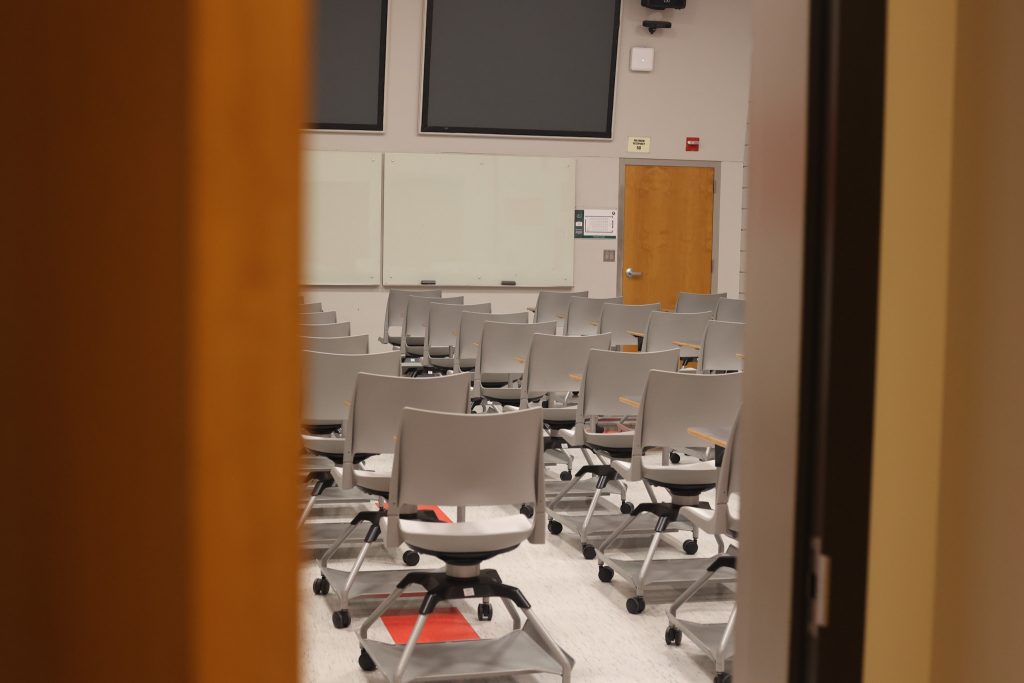Amid the ongoing conflict in the Middle East and its impact on the Binghamton University community, the Student Association (SA) Congress recently passed two pieces of legislation in response to developments on campus.
In a meeting on Oct. 10, the SA Congress passed a resolution reiterating a commitment to prevent antisemitism on campus sponsored by Saul Hakim, president of the BU Zionist Organization, an off-campus college representative and a junior double-majoring in political science and Judaic studies, co-led by six voting sponsors and 10 nonvoting sponsors. In a subsequent Oct. 24 meeting, the body passed legislation to combat Islamophobia, which was introduced by Omar Acosta-Nunez, an off-campus college representative and a junior majoring in philosophy, politics and law. The Islamophobia legislation was co-led by seven voting sponsors, six nonvoting sponsors and the Bengali Student Association.
The resolution affirming the SA’s commitment to combatting antisemitism reiterated the International Holocaust Remembrance Alliance’s definition of antisemitism resolving that the “SA commits to ongoing efforts that promote dialogue, understanding and unity among all student communities, and pledges to work tirelessly to combat bigotry, prejudice and discrimination in all forms.” The subsequent legislation reaffirming the SA’s commitment to combatting Islamophobia urged University President Harvey Stenger to release a statement explicitly condemning Islamophobia.
Christopher Ribaric, the speaker of the SA Congress and a junior majoring in accounting, described the significance of the legislation for the University community.
“I am pleased that Congress realizes that students on both sides of the ideological divide of the conflict deserve the right to feel safe and protected on campus,” Ribaric said in an email. “With the passing of this legislation […] we have strengthened our commitment to shield students at BU from the regressive and devastating effects of Islamophobia and antisemitism that have unfortunately taken root on our campus.”
Stenger’s statements in response to Hamas’ Oct. 7 attacks were criticized by multiple multicultural organizations, including the Black Student Union, Latin American Student Union, Muslim Student Association and others. They released statements saying that Stenger’s comments indicated a lack of support for Muslim, Arab and Palestinian students on campus.
Acosta-Nunez expanded on the importance of making all members of the community feel supported at the University. He said that hatred has no place at BU as an educational institution where students come to further their academic and professional careers and that it was important that students knew institutions representing them would support them.
In passing the antisemitism legislation, Hakim cited the importance of “creating a campus environment that stands firmly against antisemitism and supports the well-being of its Jewish community.”
“The urgency of passing this resolution was underscored by the alarming spike in antisemitic incidents globally,” Hakim wrote in an email. “Recognizing the connection between the unrest in Israel and the surge of antisemitism abroad, it became clear that our campus was not immune to these waves of bigotry. This resolution is an unequivocal statement of our commitment to maintaining a campus environment where students are free from the fear of being targeted for their Jewish identity. It reaffirms our resolve to create a secure and inclusive academic community, which is all the more critical in light of current events that can unsettle our students’ sense of belonging.”
On the importance of prioritizing students affected by the conflict, Acosta-Nunez expanded on the goal of recent legislations against Islamophobia to serve those impacted most.
“The resolution is meant to exemplify solidarity with the affected student body on campus,” Acosta-Nunez said. “It calls on us to understand that there are students on campus who must be heard and protected. Our job is to ensure that our students are protected and defended and that we be the liaison between the student body and the administration, calling on our administrators to protect students who are the most vulnerable during these tumultuous times.”



